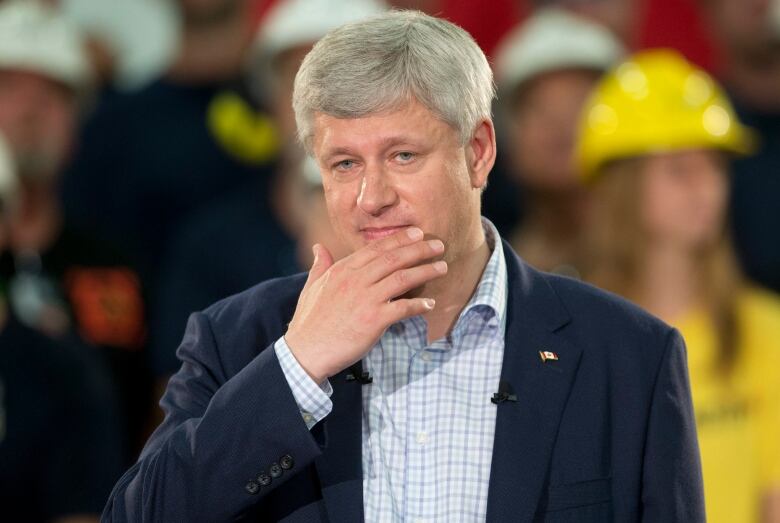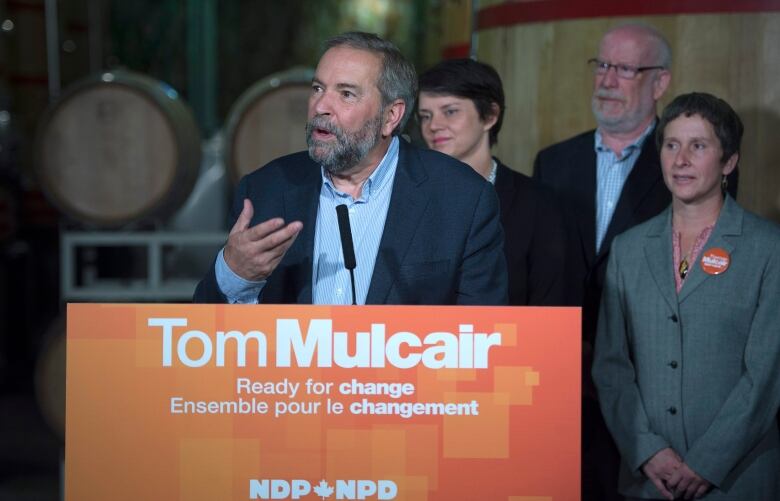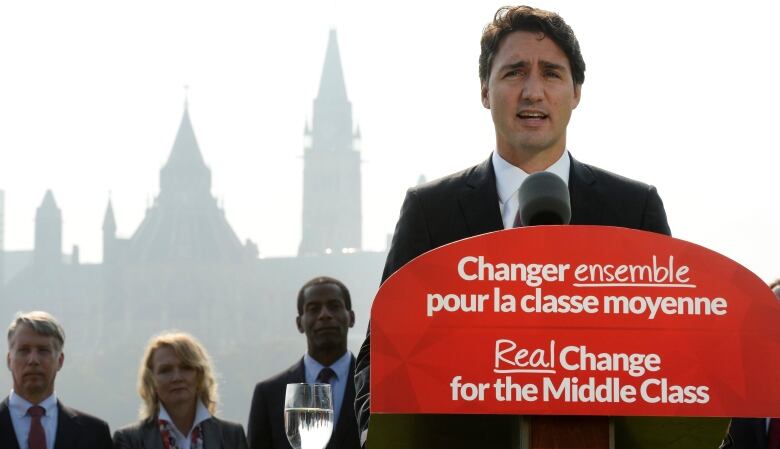Recession news hits campaign trail as parties offer competing visions
Tories point to positive growth in June as evidence that economy is rebounding
The Conservative Party's political rivals went on the offensive thismorning after Statistics Canada revealed that the country fell into a recession during the first half of thisyear.
Conservative Leader Stephen Harper, however, pointed to positive growth numbers for June as a sign that the economy is rebounding despite global instability.
The NDP wasthe first party to react after Statistics Canada made their quarterly GDP report public.
Andrew Thomson, theNDP candidate for the Torontoriding of Eglinton-Lawrencewho is running against Conservative candidate Joe Oliver,said Harper has presided over a "lost decade," marked by job losses, less retirement security and higher household debt for average Canadians.
- Canada in recession as GDP shrinks in second quarter
- How a recession would shake up the election campaign
- Recession? Knowing if we're in one matters: DonPittis
- JasonKenneytouts broader definition of 'recession'
"This is a problem of execution, and a problem of priorities," he said during a news conference at the National Press Theatre in Ottawa, where he was joined by NDP industry critic Peggy Nash.
"Canadians cannot afford Stephen Harper's failed plan. Simply put, when you're in a hole, you stop digging," he said.
Thomson cited the NDP's proposals to raise the corporate tax rate, implement a $15-an-hour federal minimum wage and roll back the age for retirement eligibility from 67 to 65 as some of the ways it would stimulate the economy.
Speaking later Tuesday during a campaign stop in B.C.'s Okanagan Valley, NDP Leader Tom Mulcairechoed Thomson's comments, saying Harper is the only prime minister of the modern era to be in office during two recessions.
Canada's previous recession began in the final quarter of 2008 and lasted intothe second quarter of 2009.
Mulcair also said a sputtering economy would not prevent an NDP government from fulfilling his promise of balancing its first budget.
"Mr. Harper's problems this fiscal year will be just that, his problem."
GDP increased in 2nd quarter by almost $4 billion - from beginning of April to end of June, a result of a buoyant month of June, up 0.5%.
—@MinJoeOliverMulcair was in B.C. to pledge support for the province's wine tourism industry.
Liberal LeaderJustin Trudeau said that regardless of any "technical definitions" of a recession,Tuesday'seconomic news is "old hat" to Canadians who are already struggling.
"Stephen Harper's economic plan has failed. And Tom Mulcair has adopted it at the worst possible time for Canadian families," Trudeausaid during a campaign stopin Gatineau, Que.
Trudeau is pitching $60 billion in new infrastructure spending over the next decade as a means of creating jobs and fostering economic growth.

The party is also promising a tax shift: Cuts for the middle class paid for in part by a tax increase for the wealthiest.To do that, the Liberal leader plans to run three straight deficits before balancing the budget in 2019.
"Stephen Harper is refusing to invest in the kind of growth that Canadians desperately need," he said."Confident, optimistic countries invest in their own future."
Data released by Statistics Canada on Tuesday morning revealed that the economy contracted at an annualized rate of0.5per cent in the second quarter of this year, the second consecutive quarter of negative growth.
Harper, speaking during a campaign stop in Burlington, Ont., said that despite a retraction in the first half of the year, the positive growth in June is a sign that the economy is rebounding.
The Statistics Canada report showed thatGDP rose by 0.5 per cent in Juneafter shrinking for five consecutive months.
"This confirms the renewed growth that most had been predicting," Harper said.

He alsorepeated his previous assertions that his government's economic vision is working, despite global economic instability. "Now more than ever, it is time to stay the course with the government's balanced-budget, low-tax plan for jobs and growth."
He made his comments as he promised new support for Canada's manufacturing sector, an industry that has been in decline, according to the most recent Statistics Canada figures.
Harper announced that, if he's elected, Burlington, Ont., will be the centre for a new, non-profit organization that will help develop new products and technologies for the manufacturing industry beginning in 2016-2017, at a cost of $30 million annually for five years.

A Conservative government would also set up a new trade promotion office within the prime minister's own bureaucracy to help attract new business into Canada and Canadian exporters, paid for by reallocating other government resources.
Both ideas mirror suggestions made by the Canadian Manufacturers and Exporters Association in itspolicy pitch to federal party leaders on how to support the sector.
With files from Catherine Cullen, James Cudmore and The Canadian Press














_(720p).jpg)


 OFFICIAL HD MUSIC VIDEO.jpg)
.jpg)



























































































